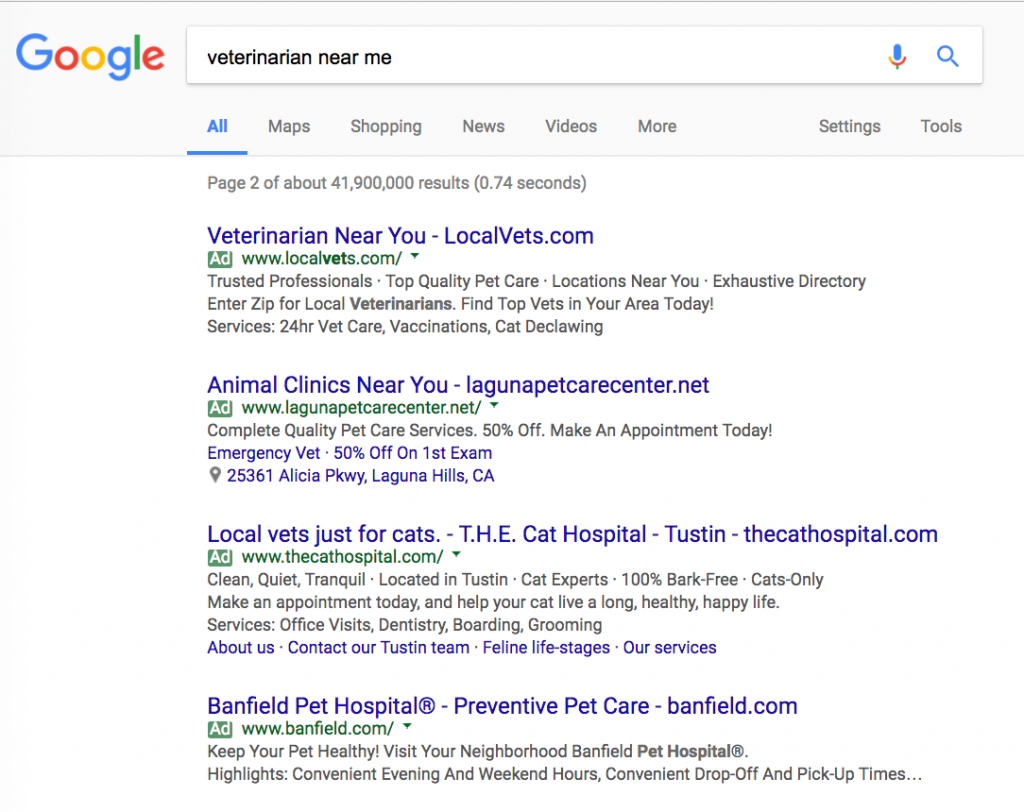SEO vs SEM: What’s the Difference and Why Does It Matter To Your Practice?
Reading Time: 5 minutesBy Sue Kim, Digital Project Manager

Search engine optimization (SEO) has been the hot topic of the digital marketing world for several years now. It is almost like a mysterious book of secrets—that if you solve the mystery of how to tap into its knowledge it will get you to page 1 of Google’s search results. Some of that is true in that no one really knows 100 percent how Google’s search algorithm works. But there are proven strategies that can help increase your website’s position in search results. It just takes patience, consistency, and strategy. You won’t see immediate results, however. So any person or company that tells you “I can get you to page 1 in two months” is not who you want to have manage your SEO.
Is there a way to have your website show up at the top of Google’s search engine results page (SERP) without having to invest months? Yes. It’s called search engine marketing (SEM), and it’s been underused and overlooked in business because it’s misunderstood.
Search Engine Optimization (SEO) vs. Search Engine Marketing (SEM)
What’s the difference between SEO and SEM? At BluePrints, we like to think of it as short-term vs. long-term search engine marketing. The end goal is the same: Reach people who are looking for your service by having your website come up higher on the search results page. There is a saying in search marketing that the best place to hide a dead body is page 2 of Google. What this dark joke means is that marketers know that people searching for something on Google will most likely click on the first relevant links they see. The goal is to get to the first page. Page 2 is still good, but page 1 is better.
SEO attempts reach page 1 organically. SEO strategies are largely focused on working inside your website—the way your website is structured, the content, etc., optimizing your website so that Google and other search engines can “crawl” your website better. The more information Google has, the better it can show your website to users looking for a service or information [Read our “Answers to Your Top 7 Digital Marketing Questions” article for SEO tips you can use on your website now]. Once people are on your website, is your website compelling enough to direct them to take action? Your copy and calls to action should be strong and clear so the visitor becomes a prospective client. You want them to not only consume the information, but pick up the phone or send an email. You want them to DO something.
SEM attempts to reach page 1 through paid advertisements. If SEO is working within the website, SEM can be thought of as directing people to the website. We must think about why they are searching online. Is it for research or to buy?
- By research, we mean users who have more time than money. They want to weigh all their options before deciding what to do or which practice they want to visit. They may open a bunch of links, read up on reviews, etc. They may browse multiple links past the first two pages of search engine results.
- By buy, we mean users who have more money than time. There is an urgency. They are looking for something and need to find the answer right away. Think of a person searching for an emergency animal hospital. They are likely in a crisis and need to find the closest pet hospital open now. SEM targets those whose purpose for searching is to buy. These people are likely to click on those links at or near the top of the first page of search engine results. Most of the times the links at the top will be ads, and will be indicated as such with an icon that says “Ad.”

While we discussed the differences between SEO and SEM, it’s important to note that a comprehensive search engine marketing plan will include both SEO and SEM strategies.
Participate in the auction. It’s free.
A word about Google AdWords Search Ads. Google AdWords is by far the most popular and sophisticated advertising platform. To use an analogy, Google AdWords is a large auction event. Paid search ads are one of the major auctions. Anyone can join in this auction. And like most auctions, you don’t have to pay to bid on an item—you only pay when you win. The difference in the search ad auction is that the items you are bidding on are keywords. And when you win, the prize is the user that clicked on your ad over your competition’s.
To put this context, let’s say a user is searching on Google for “dermatologist for dog.” You offer dermatology services and want to reach people who may be looking for one. You create an ad about dermatology services for dogs. You add a list of keywords and phrases that you think people might search for when looking for a veterinary dermatologist. You then put yourself in the shoes of the pet owner. You come up with keywords* like: dermatologists for dogs in Orange County, ear infection in dog, itchy dog, looking for veterinarian for allergies in dog, etc. After selecting your keywords, you place your bid—a dollar amount—for the keywords. Google places search ads at the top and bottom of search results. The ads that are at the very top will have the most exposure (resulting in more clicks) and, therefore, are more expensive. What you bid will be based on what other businesses are bidding. If a competitor is bidding $5 for their ad to appear with the keyword “dermatologists for dogs in Orange County” and you are only bidding $3, their ad will likely show up higher than yours.
Keywords are important.
The keywords you choose will dictate who sees your ads. If your keywords are too general, you risk getting low-quality traffic to your website. People may be clicking on your ad thinking it’s what they are looking for and leave when they see it’s not. Your bid and ad quality will dictate where your ad falls in comparison with your competitors.
If you aren’t participating, you’re missing out.
When done properly, SEM can drive quality traffic to your website. Quality traffic refers to people who are looking for the services you provide. If you are thinking about integrating digital advertising into your overall marketing plan, consider starting with Google AdWords Search Ads. If you would like assistance with setting up a Google AdWords account or management of an existing one, do not hesitate to contact us at (949) 756-8071 or info@blueprintsvmg.com.
*Keywords are for explanation purposes for only.